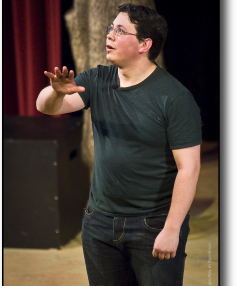Simon Camilleri works at a funeral parlour. It’s not the job you picture for a theatre graduate; but then, aside from Hugo Weaving-esque stage roles, what is?
Yet Simon is a storyteller. It’s why he’s spent the last ten years as a part-time ‘Backyard Bard’, a travelling performer. Influenced by a love of Shakespeare, Simon sought to “bring the bard to your backyard – making something that people feel is old and inaccessible and bringing it to their own sort of place.”
After coming to Christ in his teens, Simon realised there were many people who think of the Bible like they do Shakespeare.
“I had a love of theatre before I had a love of Christ,” Simon recalls. “So when I became a Christian, it seemed a natural thing to work out how to share the gospel and explore my own relationship with God through theatre.”
Simon began writing plays with Jesus-references and performing them at his university, La Trobe in Victoria. “They were too subtle, I was trying to be clever. I ended up wanting to do a show that explained the gospel as clearly as possible. But in my mind, the only imagery I had were people dressed up with tea towels around their heads and cardboard cut-out sheep. I wasn’t sure how a gospel play could be done well.”
Instead of using the Bible as ‘inspiration’ to write a play, Simon decided to try learning chunks of the Bible, as it is written. “After all,” says Simon, “It is written by brilliant storytellers.”
Simon and fellow storyteller Rob Turnbull began memorizing the Biblical stories, from Genesis, to the adventures of Elisha; from Esther, the gospels, Jonah to Revelation. In performance, it’s like a monologue, the Bible recounted in it’s raw form.
“We spend time with the text,” says Simon. “Learning it and letting it soak in, letting it speak to us. We call it ‘internalising’. It allows us to present the Biblical stories in a way that’s faithful, with the passion it deserves and in a way that’s engaging for people so they can experience the stories the way we have.”
Simon says he was overwhelmed by the number of Christians and non-Christians who found the one-man show engaging.
“There’s an almost endless amount of stories and texts from the Bible that we can share. It’s what we’ve now specialised in, mainly due to the need.”
“The culture we’re in now no longer knows the stories. And that’s who we pray our audience to be – people who don’t engage with the Bible yet. We want them to see how full of life, energy, drama it is.”
Simon is also the leader of a Bible reading ministry in his church, Bundoora Presbyterian in Victoria. He sees the ministry as an evolution of his storytelling hobby.
“I think the goal of Biblical storytelling and the goal of good public Bible reading is the same – to be faithful to the text and read in a way that’s clear and engaging.”
But Simon says public Bible reading is one of the most undervalued ministries in Australian churches.
“You can see it in how many churches read the Bible on Sundays,” he says. “They get someone at the last minute, who finds out a couple of minutes before what they’ll be reading.
“We expect so much more of our musicians, or our preachers. We expect that people doing supper are more prepared than that!”
According to Simon, the sermon helps us apply the Bible, but the Bible reading itself should be what makes us “sit up and open our ears to hear what God has to say to us.”
Drawing on his Biblical storytelling experience as part of Backyard Bard, Simon gives three tips to those reading the Bible at their church this Sunday:
- Bible reading is a practical ministry: “You’re helping people hear the Bible, usually before the sermon. So it’s important to speak it clearly, and to do that – you’ve got to be familiar with the text.”
- Bible reading is a pastoral ministry: “Reading it in a way that helps people understand it. That means, if you don’t understand for yourself what the text says, you’ll either say it in a monotone or with the wrong emphasis.
“There is an illusion that if you speak the Bible in monotone, then you’re not interpreting it and you’re letting the Bible speak for itself. But if you read something that’s supposed to be amazing in a monotone, you are interpreting. You’re communicating that it’s dry and boring.”
- Bible reading is a personal ministry: “God speaks and he uses [the Bible] to speak his word. When done well, people hear from God through human speakers. I think the Bible was written to be read out, for people to hear it. And a Bible reader who believes what they’re saying makes a world of difference.”
Watch Rob Turnbull from Backyard Bard perform 1 Corinthians 15:
Email This Story
Why not send this to a friend?

